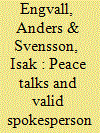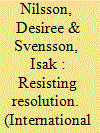| Srl | Item |
| 1 |
ID:
173738


|
|
|
|
|
| Summary/Abstract |
There have been several attempts to find negotiated solutions to the armed conflicts in Southern Thailand. Yet, these attempts of accommodation and mediated peace negotiations were aborted without any concrete results, with the exception of a formal peace process being officially launched in 2013. What explains the readiness of the parties to the conflict to enter negotiations at this stage, but not at earlier attempts? We argue that the political context can help to explain why some negotiation attempts result in negotiations, whereas others do not. We analyze the factors behind the readiness of the two sides – the Thai state and the Patani separatist insurgency – to sit down for official peace negotiations, focusing on the presence of valid spokespersons, which is an understudied element of ‘ripeness’. This case demonstrates that the problem of finding valid spokespersons may be an obstacle for peace processes especially in religiously defined conflicts.
|
|
|
|
|
|
|
|
|
|
|
|
|
|
|
|
| 2 |
ID:
173734


|
|
|
|
|
| Summary/Abstract |
The prevalence of Islamist armed conflicts is an important problem of our time. One pivotal question that remains unexplored is whether conflicts fought over Islamist claims are more or less likely to be negotiated, and if so, why? This paper provides the first large-N study exploring the relationship between Islamist claims and negotiations in all intrastate armed conflicts for the time period 1975–2011. We argue that the transnational dimension can serve to make some Islamist conflicts resistant to peaceful resolution attempts. Our findings show that while conflicts over Islamist claims generally are no more likely to see negotiations, there is significant variation within this category. When we disaggregate Islamist conflicts, we find that transnational Islamist conflicts are less likely to experience negotiations, whereas conflicts fought over separatist or revolutionary Islamist claims are no more likely to see negotiations.
|
|
|
|
|
|
|
|
|
|
|
|
|
|
|
|